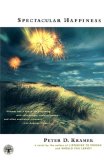Summary | Excerpt | Reading Guide | Reviews | Readalikes | Genres & Themes | Author Bio

I needed no sleep. I lay in bed with you resting on my chest. I hummed you a hum that seemed to come from beyond me and that said, All will be okay. My job for that brief while, beyond the diapering and feeding and bathing, was to will health for you and your mother. I tried to be an antenna for the good luck in the cosmos, to direct that luck into you and let you broadcast it to her. Your mother did return to us, and I slept for twelve hours. When she let me, I slept for another twelve, and then I no longer heard the harmonies of the world or the messages in babies' breath. But neither did I fully revert to my former state. I felt alive in a new way.
How does one come to one's senses? In high school, I read a play where Helen of Troy explains herself. She says that she sees the world in black and white except when men are at war. Then she sees color. I don't suppose you will have encountered that play, though in my imaginings you are a voracious reader. I was, from an early age. I was a child saved by reading.
When I came across the play about Helen, I was searching in literature, as certain teenage boys will, for clues to the nature of women. I thought Helen's lines were meant to lay bare her cruelty. I was ready to believe women could be exotically uncaring. Now I see the matter differently. Helen had found her calling. Her calling was to inspire war. I believe fatherhood might be a calling for me. Not that I claim to be expert at fathering, but I was alive when I was engaged in it.
After your mother took you away, the world turned gray. Later -- a year ago -- when Sukey led me to the Giampiccolo house, I began to return to my senses. I mention that house now, up front, because I remember you as a child who, when you were very young, could not tolerate suspense -- could not bear waiting to discover whether the bunny found his way safe home, whether the elephant came to love himself as he was. As the tension built, you seemed almost unable to stay within your body. Daddy, you would demand, tell me how it ends. I would, and then you could stand to listen to what we had skipped, the heart of the story. (How can you call it an attention deficit? I would ask the teachers. He has always been possessed by what he hears.)
In case you are still impatient, I will start by answering the question you posed on television. Yes, I did it. I am responsible for the explosions that captured the public's imagination, though Sukey deserves the lion's share of credit. Sukey was the producer. I favored quiet, limited destruction. Sukey planned extravaganzas. She was the one with the energy, the matériel, and the methods of accessing the media. Sukey supplied the vision. I did the work.
I did the work and returned to my senses, which is what makes me imagine that terrorism, the fastidious version I have practiced, might also be a calling for me. The two tasks, parenting and sabotage, are not so distant as one might imagine. Both express love and devotion. Both demand the exercise of every talent a man might possess.
In college, your mother poked fun at me: The revolutionary who reads directions, she would tease. I yearned to be loose and laid-back -- and ever more so as, in time, her joshing turned to open annoyance. Not until years later, in my talks with Manny, did I achieve a level of comfort with my discomfort. Use what you have, Manny taught. What I have is the standard my father passed on, perfectionism. Hank, if you are built that way, I hope you will find, as I have, that meticulousness has its merit.
Care in planning, care in execution, these are what have allowed our deeds, Sukey's and mine, to shape a new story. The old story of anarchism is the death of children. Even in Zola -- Zola with his anarchist sympathies, Zola unique among the greats in his appetite for change -- when a bomb goes off, a child dies. A lowly errand girl, pretty, slim, fair-haired, her stomach ripped open, her delicate face intact. Hers is the tale the culture must retell continually. Be the terrorist young or old, man or woman, idealist or cynic, the result is identical. And so in Joseph Conrad, there is poor Stevie, a mentally defective boy, delicate, like Zola's errand girl, as if a child's delicacy were the inevitable target of a bomb's brutality. More recently, in Doris Lessing -- The Good Terrorist -- a timer is misset; of the dying innocents, only one is identified, a girl of fifteen.
Copyright © 2001 by Peter D. Kramer




Happiness belongs to the self sufficient
Click Here to find out who said this, as well as discovering other famous literary quotes!
Your guide toexceptional books
BookBrowse seeks out and recommends the best in contemporary fiction and nonfiction—books that not only engage and entertain but also deepen our understanding of ourselves and the world around us.